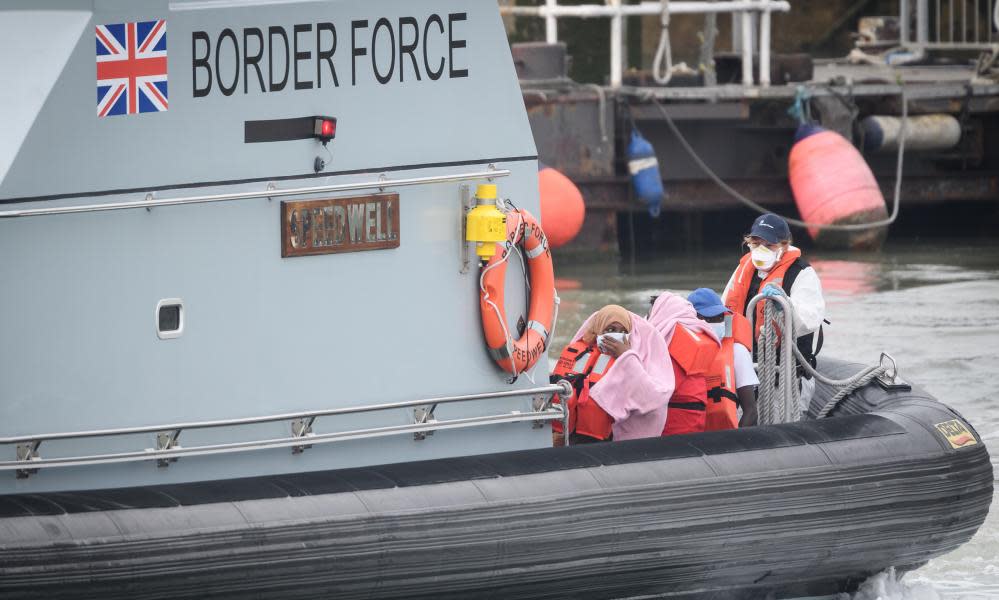Five 'safe and legal' asylum alternatives to cut Channel crossings

The government insists the way to reduce the number of people crossing the Channel in small boats is to prevent the vessels from leaving France in the first place or by intercepting the boats and returning those attempting to make a crossing.
But humanitarian groups and refugee and asylum experts argue the way to reduce the number of attempted crossings is to offer alternative “safe and legal” routes to the UK to claim asylum.
By doing this, it would reduce the number of individuals prepared to make the risky journey by sea from northern France, as well as the demand for people smugglers.
What might “safe and legal” routes look like? With guidance from migration experts, here we take a look at five potential options within the government’s power:
Protect family reunion rules
Enshrined by the so-called Dublin regulation, a European law regulates which European country should take responsibility for asylum seekers’ claims for protection and allows for families who are separated across different European countries to be reunited during their asylum claim.
Related: Refugee families reunited in UK after rescue flight from Greece
After the applicant claims asylum, the Dublin process can take up to 11 months. If the application is accepted, the applicant will legally travel to join their family. The applicant is entitled to live in the same European country as their family members while their asylum claim is processed.
The UK will no longer be bound by the Dublin regulation when the transition period for leaving the European Union expires.
Rosie Rooney, from Safe Passage International, said that while the government has said it is committed to negotiating a replacement with the EU, those negotiations have not got anywhere.

Offer more places for unaccompanied children
In 2016, after defeats in the House of Lords, the government accepted an amendment to the immigration bill proposed by Alf Dubs requiring the Home Office to accept an unspecified number of unaccompanied child refugees from Europe for resettlement in the UK. The process was subsequently referred to as the Dubs scheme.
The government capped the Dubs scheme at 480 children, although there was no legal requirement to do this. The cap has been met so the scheme has in effect ended; however, the legislation remains and the government could take more children under the scheme if it chose to do so.
Related: Q&A: what’s the real story behind recent UK refugee arrivals?
Lord Dubs, a child refugee himself, had hoped at least 3,000 could have been brought to the UK. He told the Guardian: “By giving more Dubs places, the government would offer a lifeline to children who have fled unimaginable horror only to find themselves trapped in terrible conditions in camps and on the streets in Europe.”
Utilise and expand global resettlement scheme
The UN Refugee Agency (UNHCR) operates many resettlement programmes in partnership with countries around the world, including the UK.
Resettlement programmes transfer recognised refugees from an asylum country to another third country with the aim of permanent settlement in the third country. The UNHCR assesses and grants refugee status.
The UK runs the global resettlement scheme, which consolidated a number of other programmes including one targeting Syrians, which has ended. The scheme aimed to resettle about 5,000 refugees in its first year of operation but it has been suspended due to the pandemic.
Humanitarian groups have called on the government to restart and expand the scheme. UNHCR said the government should be taking 10,000 people a year. Groups such as Safe Passage have advocated including European hotspots, such as migrant camps in Greece and northern France, within the scope of the scheme, which is “designed to respond to where the need is greatest”.
Take part in the evacuation of children from Greek islands
In October last year, Greece’s migration minister, Michalis Chrisochoidis, issued a plea for help to fellow member states of the EU. He wanted countries to take in some of the 4,000-plus unaccompanied children on Greek islands.
The holding facilities on five Aegean isles, including Moria, the squalid refugee camp on Lesbos, opposite the Turkish coast, are six times over capacity and at particular risk from the coronavirus pandemic.
The European commission ultimately responded and funded a scheme to transfer children out of the Greek islands. So far 13 countries, including non-EU states Norway and Switzerland, have taken part – but the UK has refused to help.
Humanitarian visas
A humanitarian visa would allow a person to enter the UK in order to apply for asylum and could be acquired overseas.
Some proposals, including one drawn up by the EU, suggested allowing applicants to make their case at a consulate or embassy, or at some form of delegation abroad.

 Yahoo News
Yahoo News 
